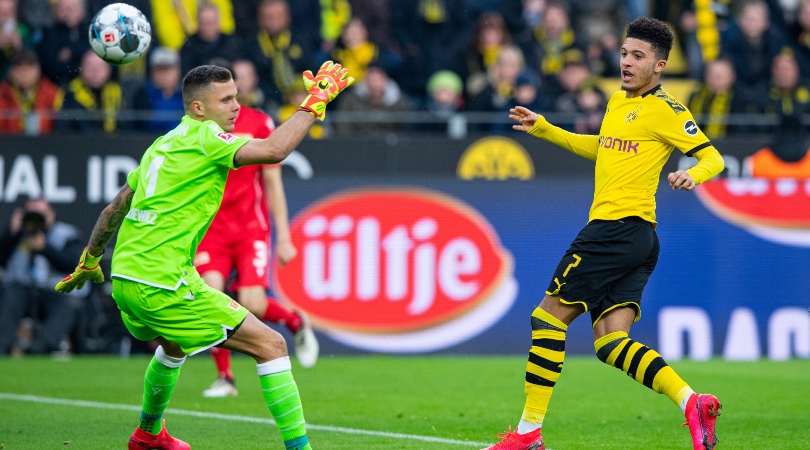Plenty of us would like to see the prodigious 19-year-old Jadon Sancho ply his trade in the Premier League – but that wouldn’t necessarily be the best thing for his development.
Borussia Dortmund eventually lost their topsy-turvy game with Bayer Leverkusen on Saturday, falling 4-3 to a late Lars Bender goal. In among the madness, though, were Jadon Sancho’s little trademarks – the perfect cross for Mats Hummels, the cute flick in the buildup to Raphael Guerrero’s goal, and a wonderful strike of his own that was ruled out by a jobsworth VAR.
The subtext to which, unfortunately, is the knowledge that Sancho is already on borrowed time at Dortmund and is likely to leave at the end of the season.
Outrageous from Emre Can! Wow! ☄️
Two touches then he shapes it into the net from 25 yards! His former club are stunned!
Dortmund lead. pic.twitter.com/likPxtaPvI
— Football on BT Sport (@btsportfootball) February 8, 2020
Relations between him and his club have been strained for some time. He was fined £86,000 in October after returning late from international duty with England and, just a few weeks later, he was subbed off before half time in the humiliating loss to Bayern Munich.
Dortmund have recovered in the months since and Lucien Favre’s job is no longer under quite the same threat. Sancho’s situation seemingly remains unchanged, though. His contract will expire in the summer of 2022 and, with an extension unlikely, a sale would appear to suit both parties.
What a shame. Not just because Dortmund were the first club to give Sancho’s talents their rightful stage – Manchester City and Pep Guardiola hadn’t rewarded him with so much as a single Premier League minute – but because he seems so well suited to what they currently are and where they might be going.
Who, for instance, is not intrigued by what he could achieve in concert with Erling Haaland? Or Giovanni Reyna, as the young midfielder gets older. What might happen if Dortmund activate their €30-million clause to retrieve Alexander Isak from Spain, where he’s been so impressive for Real Sociedad? Theoretically, Sancho could become part of one of the most thrilling forward lines in Europe, dovetailing with players who not only have complementary styles, but who are also of similarly pliable ages.
For Sancho to depart now, given that he won’t even turn 20 until March, seems premature.
From a selfish perspective, most British supporters would want him to return to England. Why not? He’s a spectacle and, ultimately, the kind of footballer who most would like the opportunity to watch in the flesh. But it also feels as if British football has been waiting too long for a Jadon Sancho-type to become so possessive. After all, he’s not just a talented footballer, but one with the social abilities to exist outside of his comfort zone.
In that respect, Sancho represents modernity. He accepted the challenge of moving to Germany as a very young man. As a boy, even. He then overcame the obstacles of a different league and a new culture, and his current reputation not only depends on his skill, but also that specific resilience. That route to the top of the game makes him more interesting in an anecdotal sense, just as the breadth of his footballing education makes him a more alluring player.
So, he’s a challenge to the orthodoxy. Sancho is not the clichéd English professional. He doesn’t complain about the different food, refuse to learn a new language or live out of an Irish pub. Instead, he’s that character’s millennial update. Less insular and far more a citizen of the world than many of his predecessors.
Within that context, a move back to England would seem like a retreat. Or a missed opportunity at least. Joining Manchester United, Manchester City or Chelsea, for instance, might come with obvious financial rewards, but it would still indicate a reversion of sorts. It would be him conforming to the idea that English players must play in England, which would be both typical, tedious and, in a way, contrary to the spirit of his own career.
He’s shown the capacity to assimilate elsewhere. He’s obviously been nourished by those experiences, too. Surely the neutral’s preference, then – if he is determined to leave Dortmund – would be to see him in Spain or Italy, acquiring whatever he can from those countries and continuing his drive towards the apex of his potential.
Perhaps this is an agenda driven by novelty. Sancho is different. He’s cosmopolitan in a way that most players from this part of the world aren’t and, as a result, can be expected to absorb the tactical and technical wealth from other countries. It’s natural, of course, to wonder what the result of that process’s continuation might be and how rounded a player it could one day produce. Well-travelled people are generally more interesting to talk to and, for much the same reason, well-travelled footballers are often better to watch.
The way Sancho plays is testimony to that. He knows when to release the ball and when to attack with it. He also appears to see the game around him in an abstract, original way, seeing passes and opportunities that many of his peers don’t. The fear, then, is that a return now, when he is still so young and still has so much left to explore, would have a homogenising effect. That he would just be encouraged to be ‘dynamic’. That his greatest virtue would be his ability to do things ‘quickly’. That, ultimately, he would be condemned to exist between English football’s narrow imperatives at a time when his abilities should be growing out in every direction.



